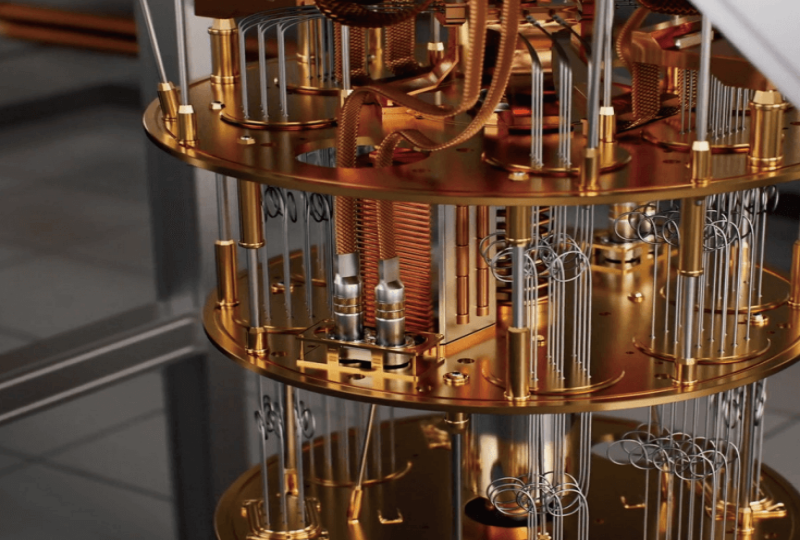Quantum Computing for Dummies: A Simple Guide to the Future
2025.03.15 · Blog
Imagine you have a magic coin. Every time you flip it, it lands on heads and tails at the same time. Sounds impossible, right? But in the world of quantum computing, that's actually how things work. Quantum computing might sound like a science fiction concept, but it’s a rapidly developing field that could revolutionize industries like healthcare, finance, and artificial intelligence.
This guide will explain quantum computing in the simplest terms, with fun examples to help you understand this mind-boggling technology.
What is Quantum Computing?
To put it simply, quantum computing is a new kind of computing that uses the principles of quantum mechanics to process information in a radically different way than classical computers. Let’s break it down.
Classical Computers vs. Quantum Computers
Classical computers (the ones you use every day) process information in bits. A bit can only be a 1 or a 0—like a light switch that’s either on or off.
Quantum computers, however, process information using quantum bits or qubits. Qubits can be both 1 and 0 at the same time—this is called superposition. Imagine you have a light switch that can be on, off, or anywhere in between!
The Power of Superposition
Let’s use a simple example: imagine you’re trying to find your way out of a maze. A classical computer would have to explore one path at a time, checking each option sequentially. But a quantum computer, thanks to superposition, can explore all possible paths at once. This is why quantum computers can solve certain problems much faster than classical ones.
Key Concepts in Quantum Computing (For Dummies)
Now, let’s break down some key terms in quantum computing that sound complicated but are actually pretty simple.
Qubits: The Magical Bits Qubits are the core building blocks of quantum computers. Unlike classical bits, which are either 1 or 0, qubits can be both 1 and 0 simultaneously. Think of qubits as magical spinning tops that can be in multiple states at once. This ability allows quantum computers to handle much more complex calculations than regular computers.
Entanglement: Quantum Twins Imagine you have two quantum coins, and no matter how far apart they are—whether they’re in different rooms or different countries—if you flip one, the other will flip the same way. This is called entanglement. It’s a phenomenon where qubits become linked, and the state of one affects the other instantly, even at great distances.
Quantum Interference: Amplifying Success Quantum interference allows quantum computers to cancel out wrong answers and amplify the right ones. Think of it like a band where all the musicians play different instruments. If everyone plays in harmony, the sound is beautiful. But if one instrument is off, it ruins the music. Quantum interference helps quantum computers avoid those wrong notes and focus on the best solutions.
Why Does Quantum Computing Matter?
You might be wondering, "Why does all this matter to me?" Well, quantum computing has the potential to solve problems that are currently impossible for classical computers. Here are a few areas where quantum computing could make a huge impact:
Drug Discovery Classical computers struggle to simulate how molecules interact. But quantum computers could help us create new medicines by simulating molecular structures more accurately and quickly. This could lead to breakthroughs in cancer treatment or even vaccines.
Cryptography Imagine trying to crack a super-secure password. With classical computers, it would take years—maybe even centuries. But quantum computers could do it in seconds, which could drastically change the way we secure information online.
Optimization Quantum computers can solve complex optimization problems, like finding the fastest route for delivery trucks or maximizing profits in stock trading. Classical computers struggle with these calculations, but quantum machines can perform them with ease.
A Real-World Example: Quantum in Action
Let’s look at a simple example. Imagine you’re organizing a school fundraiser and you want to find the best locations for the event, the best time, and the most effective marketing strategy—all while staying within a tight budget. A classical computer might have to go through every single possibility, which could take hours or even days. A quantum computer, on the other hand, could consider all these factors at once and come up with the best solution in minutes.
The Future of Quantum Computing
While quantum computing is still in its early stages, companies like IBM, Google, and SpinQ are already making significant progress. They’re working on building quantum computers that could outperform the most powerful classical computers. As the technology improves, quantum computers could solve problems we never thought possible, leading to advancements in AI, cryptography, climate change solutions, and more.
Conclusion
Quantum computing is no longer a concept reserved for scientists in lab coats. With the power of qubits, superposition, and entanglement, quantum computers are poised to change the world. Although it may seem complicated at first, understanding the basics can help you see why quantum computing is so exciting. Whether it’s finding cures for diseases or solving complex problems faster than ever before, the future of quantum computing is bright, and it’s coming faster than we think!
Featured Content
Popular Reads






.png)